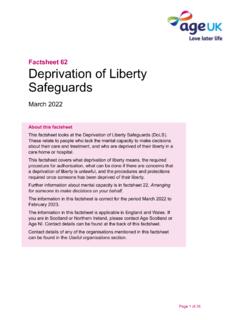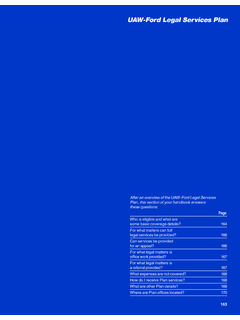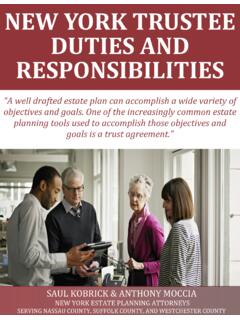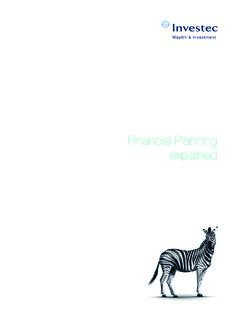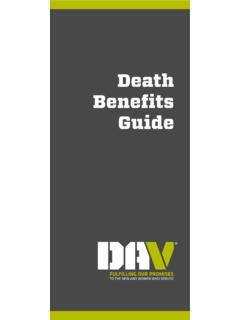Transcription of Planning for your funeral - Age UK
1 Page 1 of 32 Factsheet 27 Planning for your funeral February 2022 About this factsheet This factsheet highlights things to consider if you want to plan ahead and make financial and other arrangements for your funeral . It looks at options when deciding what type of funeral you want, ways to pay for a funeral , and information about organ donation. It may be helpful for people arranging a funeral . There is a form at the back of the factsheet to record your funeral arrangement preferences and other helpful information for family or friends. The information in this factsheet is applicable to England and Wales. If you are in Scotland or Northern Ireland, please contact Age Scotland or Age NI for advice. Contact details are at the back of this factsheet. Contact details for any organisation mentioned in this factsheet can be found in Useful organisation section.
2 Age UK factsheet 27 February 2022 Planning for your funeral Page 2 of 32 Contents 1 Introduction 3 2 Funerals during Covid-19 pandemic 3 3 Arranging a funeral 4 4 Understanding funeral costs 4 5 Deciding on burial or cremation 5 Cremation 5 Burial 5 6 Reducing funeral costs 7 Compare funeral directors 7 Arrange a funeral without a funeral director 8 Residents fixed cost funerals 8 Think about discretionary costs 8 7 Ways to pay for a funeral 9 funeral insurance 9 funeral plan 9 funeral expenses payment 10 Saving accounts 13 Occupational pension 13 Make allowance for funeral costs in your estate 13 8 NHS and local authority duty to pay for funerals 14 9 Organ and tissue donation 15 Donating organs for transplant 15 Donating your body for medical research 16 Donating tissue for medical research 16 Useful organisations 18 Age UK 20 Support our work 20 Appendix 1: Useful information for nearest relative or friend 22 Age UK factsheet 27 February 2022 Planning for your funeral Page 3 of 32 1 Introduction This factsheet is to help you to think ahead and make plans for your funeral .
3 It is usually family members who arrange a funeral but if you made a will, the primary responsibility lies with your executors. If you do not make a will, the person entitled to administer your estate generally assumes this responsibility. Reasons prompting you to plan ahead may include: thinking about funeral costs when you write or revise your will wanting to know more about funeral plans wanting to ease the future burden on your family and give them the comfort of knowing they carried out your final wishes having no close relatives and wanting to guide those who will make the arrangements in the future having a life-limiting illness and it feels the right thing to do thinking about donating an organ or your body for medical research. You may want to look at Age UK guides IG31, Wills and estate Planning ; IG03, When someone dies, and IL8, How to be an executor.
4 2 Funerals during Covid-19 pandemic The government introduced regulations and guidance during the Covid-19 pandemic. Now that restrictions have eased, there are no legal limit on the numbers allowed to attend a funeral , although venue operators may set their own limits following working safely guidelines. See for more information. In England, some people may be legally exempt from self-isolation or quarantine to attend a funeral . See #exempt In Wales, different rules apply. Check the Welsh government website: Note For information on what is possible if a person dies abroad see Appendix 1 lets you record your wishes or plans for your funeral and other helpful information for your nearest friend or relative. Age UK factsheet 27 February 2022 Planning for your funeral Page 4 of 32 3 Arranging a funeral When thinking about your funeral , possibly many years in advance, there are various things to consider.
5 For example: average cost of a funeral today and projected increases what are the basic costs and what add-ons increase the cost? how much do you want to spend and how do you want to pay for it? do you want to involve a funeral director? do you want to be buried or cremated, and in which location? do you want a service, and if so, do you want it to be led by a celebrant? do you want a particular piece of music played? do you wish to consider the environmental impact of your choices? are there people you would like to be notified of your death? are there particular clothes you would like to wear in the coffin? 4 Understanding funeral costs If using a funeral director, funeral costs have three main components: funeral director s fees these include transporting the deceased and caring for them at their premises, or in some cases transport direct to the funeral venue as well as negotiating with and paying the cemetery or crematorium.
6 Fees may include a simple coffin and use of a hearse. Disbursements unavoidable fees paid to other people when you are buried or cremated. If using a funeral director, they usually manage these payments for you. They include burial or cremation fees; celebrant fees if you have a service; fixed fees usually paid to two doctors who must complete medical certificates required if you want to be cremated. The requirement for a second confirmatory medical certificate has been suspended during Covid-19. If a death is referred to the coroner, who requires a post-mortem or inquest, the coroner issues a certificate for cremation. Discretionary costs these are affected by the type of service you want and how much friends and family do themselves. They include a more expensive coffin, pallbearers, horse drawn carriage, cars to take family members to the service, flowers, printing an order of service, organist, catering, and placing an announcement in the paper.
7 Competition and Markets Authority (CMA) The CMA requires funeral directors to display a standardised price list. This must include the price of the funeral , the price of individual items, and the price of any optional additional items or services. They must display the price of a CMA attended/unattended funeral where products and services provided are considered sufficient to deliver the funeral . Age UK factsheet 27 February 2022 Planning for your funeral Page 5 of 32 5 Deciding on burial or cremation More people in the UK choose cremation rather than burial. This may be influenced by cost, as cremation is usually cheaper. Religious, cultural, and family reasons, or having a family burial plot, can also play a role. Cremation Local authorities run most crematoria, with private companies managing the rest.
8 Contact your local authority bereavement services for details of those within reasonable travelling distance. Each crematorium has rules, including on coffins suitable for cremation, scattering or burying of ashes, and permitted memorials, for example a stone of remembrance or planted bush. It may offer plots for burial of cremated remains. They have basic and optional charges and may offer reduced rates early in the day or late afternoon. Basic fees usually include medical referee s fees (a medical referee s permission is required before a cremation can take place), an urn for ashes and use of the chapel and recorded music chosen in advance. Most have a duty list of ministers but it may not include all faiths. Direct cremation and direct burial Some funeral directors or individual companies offer these services for a fixed price.
9 It is an option if you do not want an event on the day and family would like time to think about and arrange a commemorative event. The funeral director arranges collection of the deceased and cremation at a time convenient to the crematorium. There may be an extra charge to collect the deceased if death occurs outside hospital or involves the coroner. Some companies offer family the opportunity to be present at the committal but charge for this. Direct burial is less common. This approach offers a way to reduce costs, as there is no need for a hearse, or limousine for family and mourners, and no ceremony. Your family can have ashes returned to them, although this may incur a fee. Burial In England, you have the right to be buried in the churchyard of the Church of England parish in which you die, regardless of church attendance, if space is available and it is not closed to new burials.
10 Each diocese has Churchyard Regulations explaining graveyard rules, including for headstones, memorials and burial of ashes. There are fees to dig a new grave, open a grave, move a headstone, or add an inscription. Speak to the vicar about local rules and fees. If you or a family member has a reserved space in a churchyard, you should have a document called a faculty . Age UK factsheet 27 February 2022 Planning for your funeral Page 6 of 32 In Wales, many churchyards are full but right of burial extend if you reside or die in the parish if there is space. It is the exception to be able to reserve a grave space in advance. Speak to the minister for information about rules and charges or see The alternative to a churchyard is a cemetery. Some are privately managed but most are run by the local authority.





